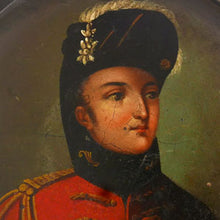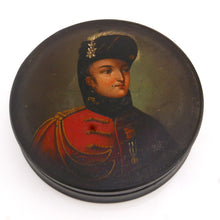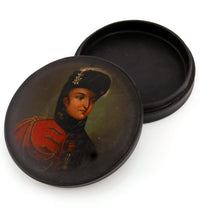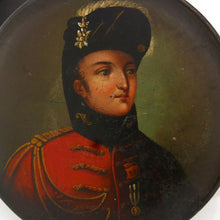Prince of Orange Snuff Box, 1815
- Regular price
- £775
- Sale price
- £775
- Regular price
-
- Unit price
- /per
Adding product to your cart
Diameter: 9.4cm
Lacquered papier maché in the manner of Georg Siegmund Stobwasser. The circular lid decorated with a quarter length portrait of the Waterloo corps commander The Prince of Orange.
The firm established by Georg Siegmund Stobwasser produced Japanned papier maché boxes from 1769 when Stobwasser settled in Brunswick. Production continued from Stobwasser’s death in 1776 into the mid 19th century, with boxes of this type being known by the Stobwasser name.
The Prince of Orange (1792-1849), later King William II of the Netherlands, served with British forces in the Peninsular War (1808-1814). By the time of Waterloo, he was 23 years old and a lieutenant-general. Much maligned by British writers seeking to underplay the contributions of the allies, his defiance of Wellington's order to retreat from Quatre Bras, is now tentatively acknowledged as averting disaster. Outnumbered three to one, the resistance of the Dutch-Belgians gave Wellington time to recover from his strategic error of spreading his forces over 100 square kilometres of southern Belgium. At Waterloo the Prince was condemned for giving the infamous ‘Square to Line order’ that resulted in heavy casulaties to the 69th (South Lincolnshire) Regiment and the loss of their King’s Colour to French cuirassiers. However Captain Pigot, 69th, defended the Prince and placed the blame for the ‘Square to Line’ order on Major Lindsay, a fellow British officer. The Prince of Orange, who was wounded by a musket ball in his left shoulder late in the battle, and who was once viciously described as an arrogant fool, may now be regarded according to the assessment of Wellington himself, as a reliable and courageous subordinate.








